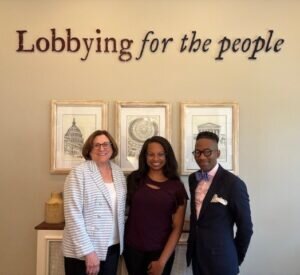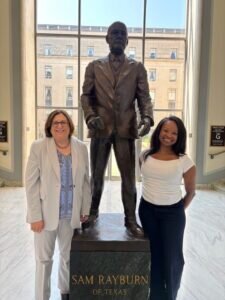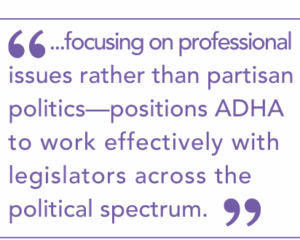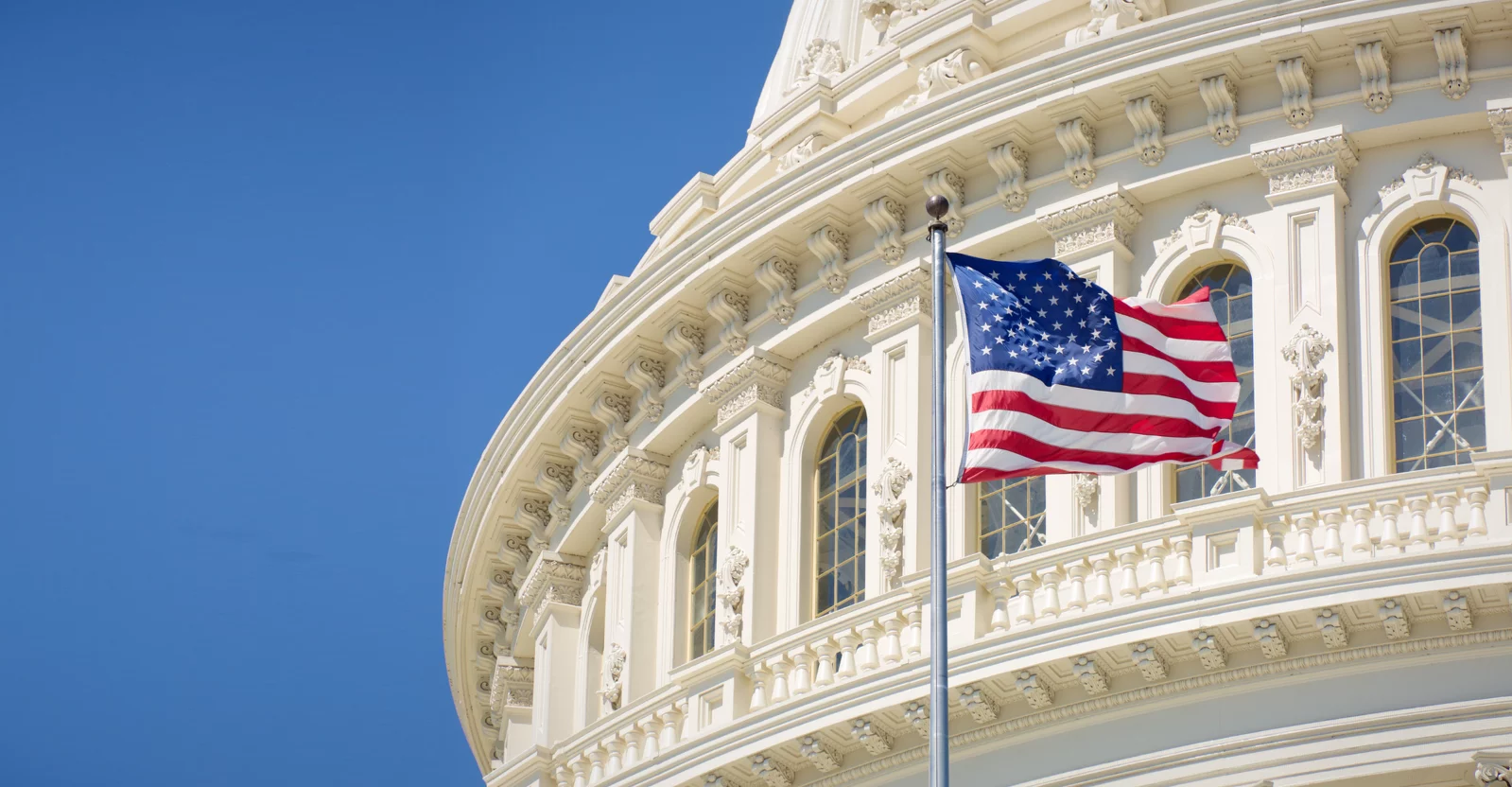By Bronwyn Barrera, MBA, ADHA Staff
August 25, 2025
The American Dental Hygienists’ Association is back in Washington D.C., and we’re playing the long game. During a productive four-day advocacy trip from July 21-24, ADHA demonstrated that effective federal advocacy isn’t about showing up with talking points—it’s about understanding what matters to each legislator and showing how the dental hygiene profession’s goals align with theirs.
Professional Partnership Makes the Difference
ADHA’s renewed federal presence is built on a smart partnership with Lobbyit, a professional bipartisan lobbying firm that brings both expertise and essential connections. The value of this partnership becomes clear in how they prepare for each meeting, open doors that might otherwise remain closed and coach ADHA representatives on legislative dynamics. ADHA staff on this visit included Dr. JoAnn Gurenlian, ADHA Director of Education, Research and Advocacy, and Katherine Williamson, ADHA Senior Manager of Advocacy.

Dr. JoAnn Gurenlian and Katherine Williamson of ADHA preparing for meetings with Lobbyit representative Quardricos Driskell.
“Quardricos Driskell is our liaison to Lobbyit, and he’s outstanding,” says Dr. JoAnn Gurenlian. “He talked with us in advance about some key items that we would want to accomplish on this visit. Then he arranged all the meetings on the Hill for us.”
Professional guidance proves invaluable in navigating the realities of federal advocacy. Williamson noted that Driskell helps assess which offices might be receptive to specific initiatives and provides crucial context about the current political landscape. At every meeting, the professional introduction establishes ADHA’s credibility from the start: “We are here representing the American Dental Hygienists’ Association, a group that represents over 220,000 dental hygienists across the country.”
Smart Messaging: One Size Doesn’t Fit All
What stands out about ADHA’s advocacy approach is how carefully the messaging is tailored for each audience. “Based on every member’s or respective office’s priorities, what we think they will take and absorb, we molded our message to them,” Williamson explained. This isn’t about changing positions—it’s about understanding what resonates.
Take the meetings with the bipartisan Oral Health Caucus, co-chaired by Rep. Mike Simpson (R-ID) and Rep. Robin Kelly (D-IL). Both offices have strong oral health backgrounds, but the conversations took different directions based on their specific interests and committee work.

ADHA staff during visits to offices of the House of Representatives at the Rayburn House Office Building in Washington D.C.
With Rep. Simpson’s office, which has appropriations experience and had previously engaged on fluoride issues, the focus included the progress of H.R. 2001, a measure introduced by Rep. Kelly to reauthorize a dental workforce grant program which was cut from last year’s omnibus bill. When Simpson’s staff showed interest in ADHA’s proposed fluoride resolution and asked for the specific language, it represented an openness to the kind of progress that builds momentum over time.
Rep. Kelly’s office, known for her work in Medicare and black maternal health, offered a different but valuable opportunity. Her office invited ADHA to contribute to Kelly’s monthly state-specific newsletter publication, creating an ongoing platform for education and relationship building.
Opening Eyes to Rural Realities
Some of the most impactful conversations centered on rural healthcare access—an issue that transcends party lines. The staff of Rep. Brett Guthrie (R-KY), representing a rural district, were particularly engaged when discussions turned to expanding the dental workforce in underserved communities. ADHA emphasized the particular importance of dental hygienists in rural communities, highlighting how expanding the dental hygiene workforce could help address access to care challenges.
Other conversations sometimes revealed knowledge gaps about basic oral healthcare access. During their meeting with Sen. Jim Banks’ (R-IN) office, when ADHA representatives explained that people in rural or underserved communities might not have access to toothbrushes or toothpaste, or might share oral hygiene supplies among family members, these eye-opening realities helped legislators better understand the challenges facing their own constituents. These weren’t scripted talking points—they were insights that deepened the conversation about healthcare access.
The office of Rep. Neal Dunn (R-FL), a physician, brought valuable healthcare perspective to discussions about oral health priorities and workforce issues.
The office of Rep. Frank Pallone (D-NJ), the ranking member of the House Energy & Commerce Committee, was particularly interested in access to care issues. His committee position makes him valuable for future fluoride resolution efforts, since such legislation would likely move through Energy & Commerce.
The FDA Experience: Contributing to the National Dialogue
Beyond Capitol Hill meetings, ADHA participated in FDA testimony at the agency’s White Oak Campus—an experience that proved educational, substantive and very much worthwhile.
The FDA panel balanced public representatives sharing lived experiences with scientific experts presenting research data. Gurenlian presented oral testimony on behalf of the ADHA, along with other proponents, opponents and researchers. “The researchers were unbelievable,” Gurenlian observed. “They presented the data, what the science says about the effect of fluoride on the gut microbiome, on thyroid disease, on neurodevelopmental disorders and so on, just negating one myth after another.”
The professional nature of most testimony contrasted with more confrontational anti-fluoridation advocates, with approximately 75% of testimony supporting keeping prescription fluoride supplements available for children. ADHA’s contribution added to this substantial professional consensus.
Playing the Long Game
The complexity of federal advocacy becomes clear when considering the strategic timing needed for success. ADHA is working toward introducing a fluoride resolution around September 30, the final day of the fiscal year and just before National Dental Hygiene Month begins on October 1. Of course, what happens after September 30 depends on whether appropriations pass, a continuing resolution keeps the government running, or operations shut down entirely—all unpredictable possibilities that affect legislative timing.

This uncertainty underscores why relationship-building matters so much in advocacy and lobbying. “We are rebuilding and maintaining a presence on the federal level, and that takes time and effort,” Gurenlian emphasized.
The goal isn’t just supporting specific legislation—it’s positioning ADHA as a trusted resource that legislators can turn to for expertise on oral health and workforce issues. As one office after another expressed interest in ongoing dialogue, it became clear that this foundation of professional relationships will serve our association well for years to come.
Your Role in Federal Advocacy
ADHA recognizes that sustainable federal advocacy requires broader membership engagement. Bringing in more member expertise as advisors and planning lobby days could bring additional dental hygienists to Washington.
“ADHA is a voice on Capitol Hill, but it would be great if we had 220,000 voices,” Gurenlian noted. Encouraging individual members to understand their own representatives’ positions and priorities also helps them contribute effectively to advocacy efforts in their home states and districts.
Individual members can support advocacy efforts by staying engaged through ADHA’s Voter Voice campaigns, participating in regional meetings, reading the new Advocacy in Action newsletter, and watching for lobby day opportunities. Understanding where representatives stand on healthcare and workforce issues gives you the foundation to be an effective advocate for your profession.
As Williamson emphasized, “ADHA is a nonpartisan organization. We aren’t travelling to DC to champion anyone’s politics. We’re there to represent the major issues affecting the dental hygiene profession and public oral health.” This principled approach—focusing on professional issues rather than partisan politics—positions ADHA to work effectively with legislators across the political spectrum.
Gurenlian was quick to praise Williamson’s leadership throughout the trip: “Because of her background and experience in this area she was able to lead the way in many instances, and she made sure that we communicated all our points depending on whom we were with and what their focus was. Kudos to her! So, we’re so lucky to have an ADHA staff member who has staffer experience in D.C.”
Looking Ahead

The July Washington D.C. trip represents more than successful meetings—it demonstrates ADHA’s commitment to sophisticated, professional advocacy that prioritizes relationship-building and strategic thinking over quick wins. For members wondering whether their association dues are making a difference on the federal level, the answer is increasingly clear: ADHA is rebuilding a meaningful presence in Washington, one strategic relationship at a time.
The next time you hear about federal legislation affecting oral health or dental workforce issues, know that ADHA is likely already in the conversation, representing your interests with the professionalism and strategic thinking that effective advocacy requires.
____________________________________
Bronwyn Barrera, MBA is the director of the ADHA’s Marketing & Communications Department. She can be reached at [email protected].



